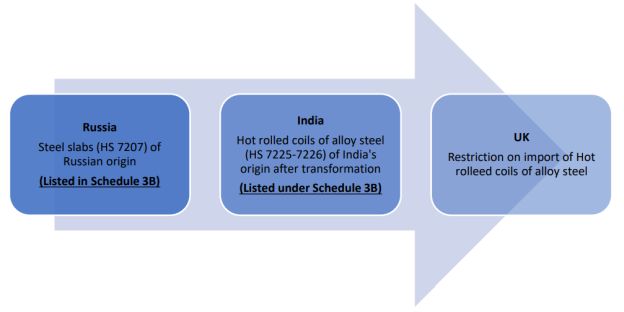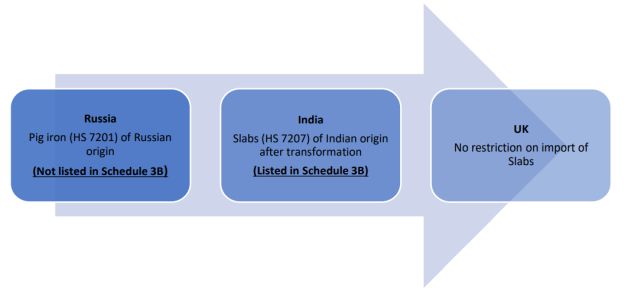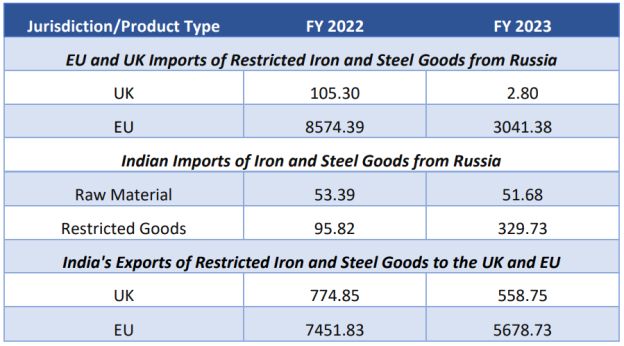Introduction
As the Ukraine conflict rages on, the use and enforcement of sanctions against Russia also continues to escalate. Several critical sectors of economic importance to Russia have been targeted by the West, with a prominent example being the UK's and the EU's prohibitions on imports of Russian-originating iron and steel.
In an effort to address the circumvention of these prohibitions by Russian-origin iron and steel, the UK and EU recently introduced new restrictions on third-country processed iron and steel. These third-country restrictions will come into effect on September 30, 2023, in the UK and three phases in the EU, starting on the same date.
This update provides a high-level overview of these restrictions and important considerations for Indian exporters.
UK Restrictions
The UK's restrictions on third-country iron and steel are set out in the Russia (Sanctions (EU Exit) (Amendment) Regulations 2023 ("UK Regulation")1. These restrictions prohibit the import of certain iron and steel products that incorporate iron or steel inputs originating in Russia and undergo processing in other 'third' countries. More specifically, the UK prohibits the import of iron and steel if:
- such iron and steel are listed in Schedule 3B of the UK Regulation;
- has been altered, transformed in any way, or subjected to any type of operation or process in a third country; and
- incorporates one or more Russian-origin iron and steel listed in Schedule 3B.
In addition, the UK could require traders to demonstrate with evidence a product's supply chain at the UK border, including documentation of the country of origin of iron and steel processed in third countries, the date of dispatch from the country of origin, location of processing, etc. 2
Lastly, the UK Regulation sets out exceptions to the third-country processed iron and steel restrictions. For example,3 an importer after September 30, 2023, can apply for a license to import restricted iron and steel processed in a third country. However, licenses will only be granted in exceptional circumstances, depending on parameters such as whether the import is of iron and steel that left Russia before April 21, 2023.
EU Restrictions
The EU's restrictions on third-country iron and steel are set out in EU Regulation (EU) 833/2014 ("EU Regulation"). 4 These restrictions, which are similar to the UK prohibit the import of iron and steel if:
- such iron and steel products are listed in Annex XVII of the EU Regulation; and
- processed in a 'third country' country but incorporating Russian-originating iron and steel products listed in Annex XVII.
The EU's restrictions will be implemented in over three phases, starting on September 30, 2023. The classification code of the imported iron and steel products will determine which phase the product falls into.5
In addition, the EU's restrictions include a positive requirement for importers to provide evidence of the origin of iron and steel inputs used in the processing of third-country iron and steel. 6 This means that at the time of importation, importers will need to be able to demonstrate that the iron and steel products they are importing do not incorporate any Russia-originating prohibited iron or steel inputs.
No Minimum Threshold of Russian-origin Iron and Steel
The UK and EU regulations do not seem to set out any minimum amount of Russian iron and steel to be present in third-country processed iron and steel products for those products to be banned from entering their markets. In other words, even if a third-country processed product contains a minuscule quantity of Russian iron and steel, it can still be banned from entering the UK and EU markets, as long as the import falls under the relevant schedules of the prohibited list of items.
Illustration 1:7

Illustration 2:

Impact on Indian Exporters
The UK and EU's imports of Russian-origin iron and steel have recently declined. However, India's imports of Russianorigin iron and steel as well as exports of iron and steel to the UK and EU, have continued.
Table 1:

Source: Figures in USD/Million from ITC Trade Map & Department of Commerce, India TradeStat
The importers in the EU and the UK would be required to conduct due diligence and verify from their related/unrelated suppliers in third countries (for example, India) to ensure that there is no use of the restricted iron and steel in the exports being made from such third countries to the UK or the EU. At the same time, Indian exporters that import Russian-origin iron and steel and incorporate them to produce finished/end products should carefully review the UK/EU's new restrictions on third-country processed iron and steel, assess the impact thereof on their export business, and take steps to ensure compliance inter alia by considering the following parameters:
- Reviewing if the iron and steel products being procured from Russia or products produced using Russian iron and steel products in a third country are prohibited;
- Identifying the direct or indirect suppliers of iron and steel products and obtaining confirmation on whether any Russia-originating iron or steel inputs were used;
- Implementing due diligence procedures for verifying evidence of the origin of inputs used/provided by suppliers;
- Identifying if any of the direct or indirect suppliers are sanctioned entities as part of general due diligence to ensure compliance with sanctions and export control laws in general.
Economic Laws Practice ("ELP") has been assessing sanctions and export control-related regulations in multiple jurisdictions and regularly advising clients of any potential exposure to such regulations on account of their potential business engagements in restricted items and/or certain sanctioned countries. ELP also has a reach that extends to multiple markets across the globe through its extensive network of foreign lawyers and consultants, who in turn work closely with regulators and authorities in their jurisdictions.
Footnotes
1. Regulation 46IA and 46IB of the Russia (Sanctions (EU Exit) (Amendment) Regulations 2023.
2. Guidance on third country processed iron and steel measures, UK Department of International Trade, available at: https://www.gov.uk/government/publications/notice-to-importers-2953-russia-import-sanctions/guidance-on-third-countryprocessed-iron-and-steel-measures
3. Ibid.
4. Article 3g of Council Regulation (EU) No 833/2014 of 31 July 2014 concerning restrictive measures in view of Russia's actions destabilising the situation in Ukraine, version as of 1 October 2023.
5. "...with regard to products listed in Annex XVII processed in a third country incorporating steel products originating in Russia of CN codes 7207 11, 7207 12 10 or 7224 90, this prohibition shall apply as of 1 April 2024 for CN code 7207 11 and as of 1 October 2024 for CN codes 7207 12 10 and 7224 90;..." – See Article 3g (d) of the EU Regulation
6. "For the purposes of the application of this point, at the moment of importation, importers shall provide evidence of the country of origin of the iron and steel inputs used for the processing of the product in a third country;..." – See Article 3g (d) of the EU Regulation
7. Guidance on third country processed iron and steel measures, UK Department of International Trade, available at: https://www.gov.uk/government/publications/notice-to-importers-2953-russia-import-sanctions/guidance-on-third-country-processed-iron-andsteel-measures
The content of this article is intended to provide a general guide to the subject matter. Specialist advice should be sought about your specific circumstances.




